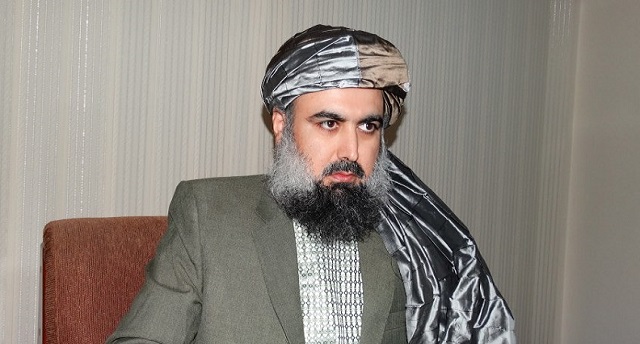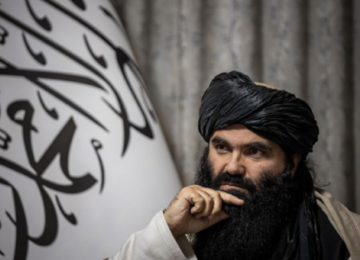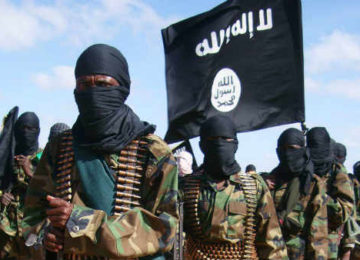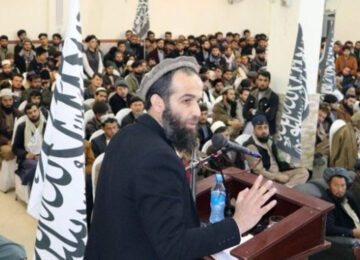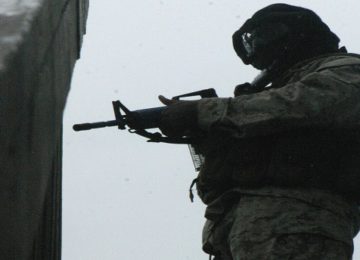Agha Jan Mutasim – former Afghan Taliban minister called on Sunday for enhanced dialogue between Afghanistan and Pakistan, terming it “a key to peace and stability in both countries and the region”.
In an interview with Daily Times, Mutasim welcomed the recent visit to Kabul by Pakistan Army Chief General Qamar Javed Bajwa and President Ashraf Ghani’s willingness to visit Pakistan.
Afghan Ambassador in Islamabad Omar Zakhilwal has confirmed President Ghani had accepted invitation to visit Islamabad. The army chief had extended the invitation to the Afghan leader on behalf of the government when they met in Kabul on October 1st, Zakhilwal says.
“The visit of Pakistan army chief to Kabul was the right decision. Pakistan and Afghanistan should continue high level exchanges. Such interaction is in the interest of Pakistan and Afghanistan as well as the region,” said Muasim, who served as finance minister during their 1996-2001 rule.
The Taliban leader said as President Ghani had now offered dialogue to Pakistan, there should be a positive response from the Pakistani leaders.
“President Ghani was earlier reluctant for talks with Pakistan, but now he has shown willingness to talk to Pakistan. Pakistan and Afghanistan should sincerely take the process of bilateral dialogue forward,” he said.
“Pak-Afghan dialogue will produce useful results for both the violence-stricken countries and the whole region. Other countries also have the responsibility to work for peace and stability in the region, but Pakistan and Afghanistan have a fundamental role and they should create understanding and work for peace that will have fruitful results,” he said.
Mutasim, who had launched his peace initiative years ago, is opposed to the war and is also currently campaigning for negotiations to find out a political solution.
He currently holds no position in the Taliban hierarchy, but enjoys strong relations with the family of the Taliban founder Mullah Mohammad Omar, the incumbent Taliban chief Maulvi Haibtullah and the Taliban deputy chief Sirajud Din Haqqani, according to Taliban sources.
Mutasim opposed the closure of the Taliban Qatar political office and said reports that President Trump and President Ashraf Ghani wanted to close the office were disappointing.
“Calls for the closure of the office were made because of its ineffective role of the Qatar office to push for the political negotiations. It was opened for the political option so it should remain open and must be used for its objectives. I am afraid it could be shut down if it fails to play a role in peace negotiations,” the Taliban leader said.
“There is the possibility that the US could opt for shutting down the office, but if it starts some activities to achieve the goal of peace process, it will be successful,” he went on to say.
To a question about the outcome of President Donald Trump’s strategy for Afghanistan, he said although the new policy mainly focused on the use of force, it had also kept political options open.
“So the violence-affected countries like Pakistan and Afghanistan should closely work to press for the political option rather than the use of force. Pakistan, Afghanistan and the regional countries should not miss this opportunity. If this option is not used, both countries and the region can slip into chaos,” the Taliban leader said.
As there is no immediate possibility of Taliban talks with the Kabul administration, the region including key stakeholders are scheduled to meet in Moscow in few days to explore options for peaceful solution to the Afghan conflict.
Russia is scheduled to host a meeting of the Afghan contact group meeting of the Shanghai Cooperation Organisation (SCO) on October 11.
Spokesperson of the Russian Foreign Ministry Maria Zakharova said on October 4 that the member countries of the SCO-Afghanistan Contact Group would exchange opinions on the current situation in Afghanistan to discuss “paths towards a settlement there and to strengthen cooperation between the SCO and Afghanistan”.
The group was established back in 2005 by decision of the Council of Foreign Ministers of the SCO to coordinate efforts in the fight against terrorism, separatism, extremism and drug trafficking, as well as to launch consultations between the SCO and Afghanistan and to involve the SCO in international programmes of assistance aimed at stabilising the socioeconomic and humanitarian situation in Afghanistan.
An agreement was reached at the SCO summit in Astana in June this year at Russia’s initiative to re-launch the Contact Group at a higher level, or more precisely, at the level of deputy foreign ministers.
This decision was taken due to the continued deterioration of the situation in Afghanistan and the alarming growth of activity by terrorist groups there, including ISIS, which compounded regional security risks, according to the Russian FM’s spokesperson.
“We are convinced that our joint efforts within the SCO framework will promote the revival of Afghanistan as a peaceful, stable as well as an economically prosperous country,” Maria Zakharova said at her last week briefing posted on Twitter.
The SCO comprises eight member states: India, Kazakhstan, China, the Kyrgyz Republic, Pakistan, the Russian Federation, Tajikistan, and Uzbekistan.
A Pakistani official said Pakistan would participate in the SCO meeting and would press for the regional countries’ role in finding out a political solution to the Afghan problem. He said most of the regional countries were opposed to military option as it had not worked in 16 years and Afghanistan is currently faces more security challenges.
The writer Tahir Khan is an advisor to CRSS-ASC, and a member of Pak-Afghan Track 1.5/11 Beyond Boundaries’ Pakistan group.
© Center for Research and Security Studies (CRSS) and Afghan Studies Center (ASC), Islamabad.



